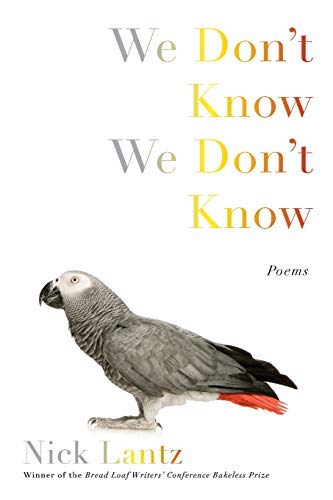What do you think?
Rate this book


Paperback
First published January 1, 2010
"
As you know, during the Cat Festival in Ypres,
effigies of cats are thrown from a belfry tower
(live cats were thrown until 1817).
Revelers, dressed as cats and witches,
dance in the street.
As you know, this is the only event of interest
ever to occur in Ypres.
(from "As You Know")
Think of all the beautiful Bigfoots striding
forever into the forest of our unknowing.
(from "Homeless in the Land of Aphorism")
Stranded with you at the Ferris wheel's apogee
I learned the physics
of desire — fixed at the center,
it spins and goes nowhere.
(from "Ancient Theories")
(To say that the heart rests between
beats says nothing of its tirelessness.)
(from "Things Will Not")
Will you ask questions you know are beyond his knowledge?
Will you ask questions that have no answers?
Will he say, No more for today, please?
Will you listen?
In the letters his wife sends, will she have left a blank space exactly the length of the words Where are you?
Will there be a window at all?
Will you show him your pistol just once?
Will you ask him what he did before the war?
Will a bucket in the corner continue to catch the drip of water?
Will he say, I was a farmer?
Will he say, I salvaged scrap metal?
Will he say, I was a faith healer who traveled in a covered wagon?
Will he say, I was a thief?
Will he say, I was an interrogator?
Will he say, I was a weaver?
Will you admit you've never understood the mechanics of the loom, how the shuttle racks back and forth and a pattern emerges?
WIll he say, The loom has been more essential to the development of civilization than the printing press or the cotton gin?
Will he say, I was a scribe when the centurions crucified your god?
Will you ask, How could you sit by and do nothing?
Will he say, It was my job to record such things, not to intercede?
Will you ask the stenographer to strike his last statement from the record?
Will there be a stenographer?
Will there be any record of what you've done, what you plan to do?
After many weeks, during a lull in the "questioning," will you speak of the first time your fingers grazed the inside of your wife's thigh?
Will he nod and say, Yes, I remember too, the smell of my own wife's hair on my face in the morning?
Will you ask him how he can remember anything?
Will he admit that more than once he has tried drowning himself in that bucket of dripped-down water?
Will you say, I know, we watch you day and night?
Will he ask, How could you sit by and do nothing?
Will you say, We thought you were praying?
Will you say, Even to witness an atrocity is a kind of courage?
Will you say, The remedy is worse than the disease?
Will you say, I misspoke, we see nothing?
Will you say, Such things are not up to me?
Will he say, After I failed, I had to wait ten years for the bucket to fill so I could try again?
Will you say, It was a hundred years?
_____, for Which There Is No Translation
Traduttore, traditore (Proverb)
_____, by which the islanders mean an empty boat
alone on the water,
one's only boat, which has drifted off, too far out
for even the strongest swimmer
to reach, beyond
saving, which is to say hopeless, but visibly so, and thus
a reminder of how seeing something
is not the same as possessing it.
_____, by which travelers mean falling asleep on a train
and waking hours later to discover that the other passengers
have all been replaced
by new travelers, that even the agent who punched your ticket
is gone, has ended
his shift at some earlier station, and your heart feels
like a pair of couplers holding two freight cars
together in a long turn.
_____, by which the bereaved mean the memory of walking
into the house and seeing some small object
askew: half-flayed orange
left on the table, cup of tea gone cold, dog-eared magazine
pages flailing in the breeze.
_____, by which I mean an ice storm, one that glazes
each leaf of the backyard maple — creating, after
the real leaves have dropped
away, ice replicas, each xylem and phloem preserved
as if cut into glass, though of course they are not really leaves, no matter how
they dazzle you.
New leadership and a cathartic election have restored some of our immediate hopes for America. But hope is not the work of a moment. Lantz has his eye on the long haul: how deeply, how steadily we must probe the fonts of feeling and thought if we are to address the afflictions that all-too-chronically ail us.